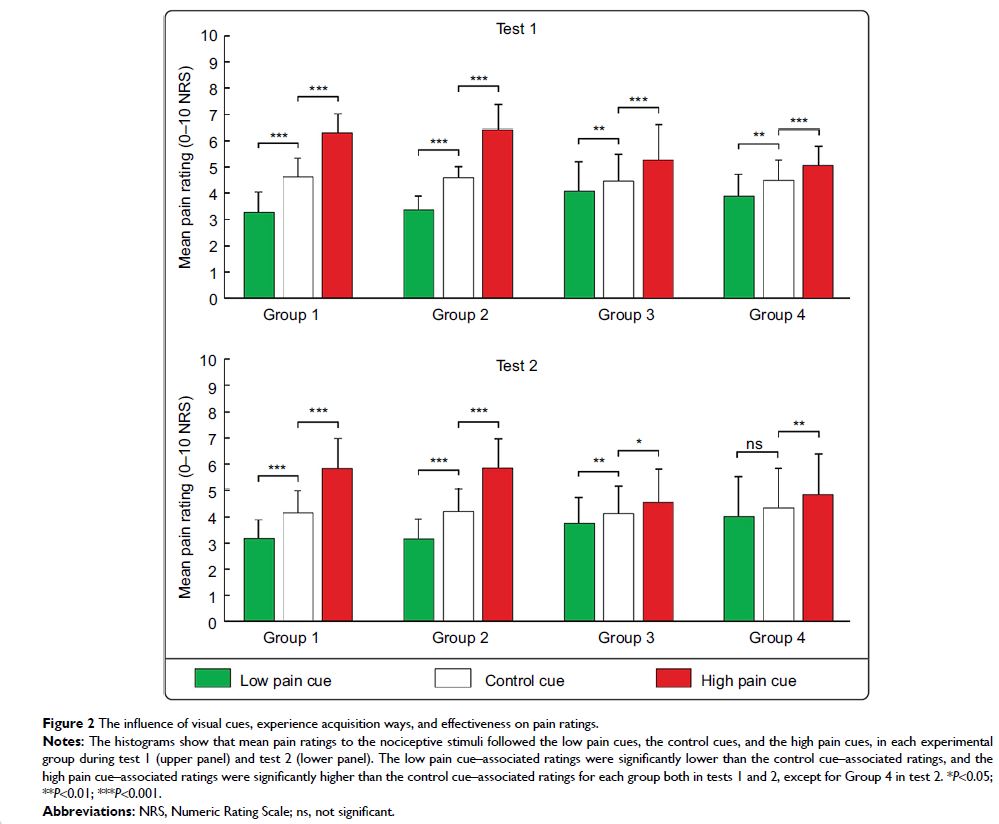108985
论文已发表
注册即可获取德孚的最新动态
IF 收录期刊
- 3.4 Breast Cancer (Dove Med Press)
- 3.2 Clin Epidemiol
- 2.6 Cancer Manag Res
- 2.9 Infect Drug Resist
- 3.7 Clin Interv Aging
- 5.1 Drug Des Dev Ther
- 3.1 Int J Chronic Obstr
- 6.6 Int J Nanomed
- 2.6 Int J Women's Health
- 2.9 Neuropsych Dis Treat
- 2.8 OncoTargets Ther
- 2.0 Patient Prefer Adher
- 2.2 Ther Clin Risk Manag
- 2.5 J Pain Res
- 3.0 Diabet Metab Synd Ob
- 3.2 Psychol Res Behav Ma
- 3.4 Nat Sci Sleep
- 1.8 Pharmgenomics Pers Med
- 2.0 Risk Manag Healthc Policy
- 4.1 J Inflamm Res
- 2.0 Int J Gen Med
- 3.4 J Hepatocell Carcinoma
- 3.0 J Asthma Allergy
- 2.2 Clin Cosmet Investig Dermatol
- 2.4 J Multidiscip Healthc

由社会观察获得的先前经验对安慰剂和诺斯波反应的持续影响
Authors Zhang H, Zhou L, Wei H, Lu X, Hu L
Received 1 August 2017
Accepted for publication 22 October 2017
Published 8 December 2017 Volume 2017:10 Pages 2769—2780
DOI https://doi.org/10.2147/JPR.S147970
Checked for plagiarism Yes
Review by Single-blind
Peer reviewers approved by Dr Minal Joshi
Peer reviewer comments 2
Editor who approved publication: Dr Katherine Hanlon
Background: Social observation is one of the main ways to gain experience.
Similar to first-person experience, observational experience affects the
effectiveness of subsequent treatments. Yet, it is still undetermined whether
the influence of social observation on placebo and nocebo effects to subsequent
treatments remains even if related experience occurred a few days ago.
Methods: Eighty-two participants were recruited and each
of them was randomly assigned to one of the four experimental groups acquiring
first-person or observational experience, which was either effective or
ineffective. For the first-person groups, participants were presented with pain
cues paired with pain stimuli in person. In the effective condition, low pain
cues were paired with low pain stimuli, and high pain cues were paired with
high pain stimuli. In contrast, the associations between cues and pain stimuli
were not established in the ineffective condition. Similarly, for the
observational groups, participants received effective/ineffective treatment
through observation. Five or six days later, all participants underwent a
conditioning phase followed by a test phase composed of two tests, where
participants were asked to report their perceived pain.
Results: Placebo and nocebo responses to subsequent
treatments can be affected by prior experience gained several days ago
regardless of acquisition ways, and both placebo and nocebo responses in the
effective condition were significantly larger than those in the ineffective
condition. Furthermore, once placebo and nocebo effects were elicited, the
latter was more persistent, while the former was more likely to diminish.
Conclusion: First-person and observational experience obtained a
few days ago could affect the following treatments, which advance our
understanding of the crucial and sustained influence of social observation on
placebo analgesia and nocebo hyperalgesia, and provide insights into clinical
applications.
Keywords: social
observation, prior experience, placebo analgesia, nocebo hyperalgesia,
conditioning, expectancy
